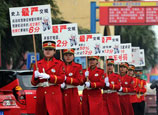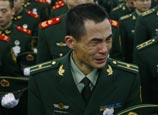
On Jan. 3, 2013, the Seoul High Court of South Korea ruled that Chinese national Liu Qiang, who was suspected of arson attack at Japanese Embassy in Seoul, will not be extradited to Japan for trial. According to the ruling, Liu committed a crime out of righteous cause in politics, additionally he caused no casualties. Liu was immediately released on the same day and returned to China on the morning of Jan. 4.
Committing a crime out of righteous cause
According to the report of South Korean media, Liu was arrested for throwing a frangible grenade to Japanese Embassy in South Korea in January 2012, and was sentenced to 10 months' imprisonment. Liu finished his jail term in South Korea on Nov. 6, 2012, and he again drew attention of the public.
38-year-old Liu had been an English lecturer and psychotherapist. He said he did so to maintain the dignity of both South Korean and Chinese people who had been comfort women. Liu said Japanese army had forced his grandmother to be a comfort woman and his great-grandfather was tortured to death by the Japanese. "I am angry because the Japanese government does not recognize the history," Liu said on trial.
Which country should Liu be extradited to?
The Seoul High Court approved the opinions of Liu's defense team and judged that Liu was a political prisoner. The court said that extraditing Liu to Japan did not comply with the political order and constitution of South Korea and also the universal value of the most civilized countries.
The court decision immediately aroused great concern in China and Japan. The spokesperson of the Foreign Ministry of China Hua Chunying said on Jan. 3 that Chinese side has found the decision welcomed while the Ministry of Foreign Affairs of Japan made a strong protest against the South Korean government, saying that the decision lacked of reasonable and legitimate reasons, did not abide by the extradition agreement between Japan and South Korea and this would affect the international reputation of South Korea.















 Girl wearing "military uniform" parade on the street to publicize the new traffic regulation
Girl wearing "military uniform" parade on the street to publicize the new traffic regulation


![]()
